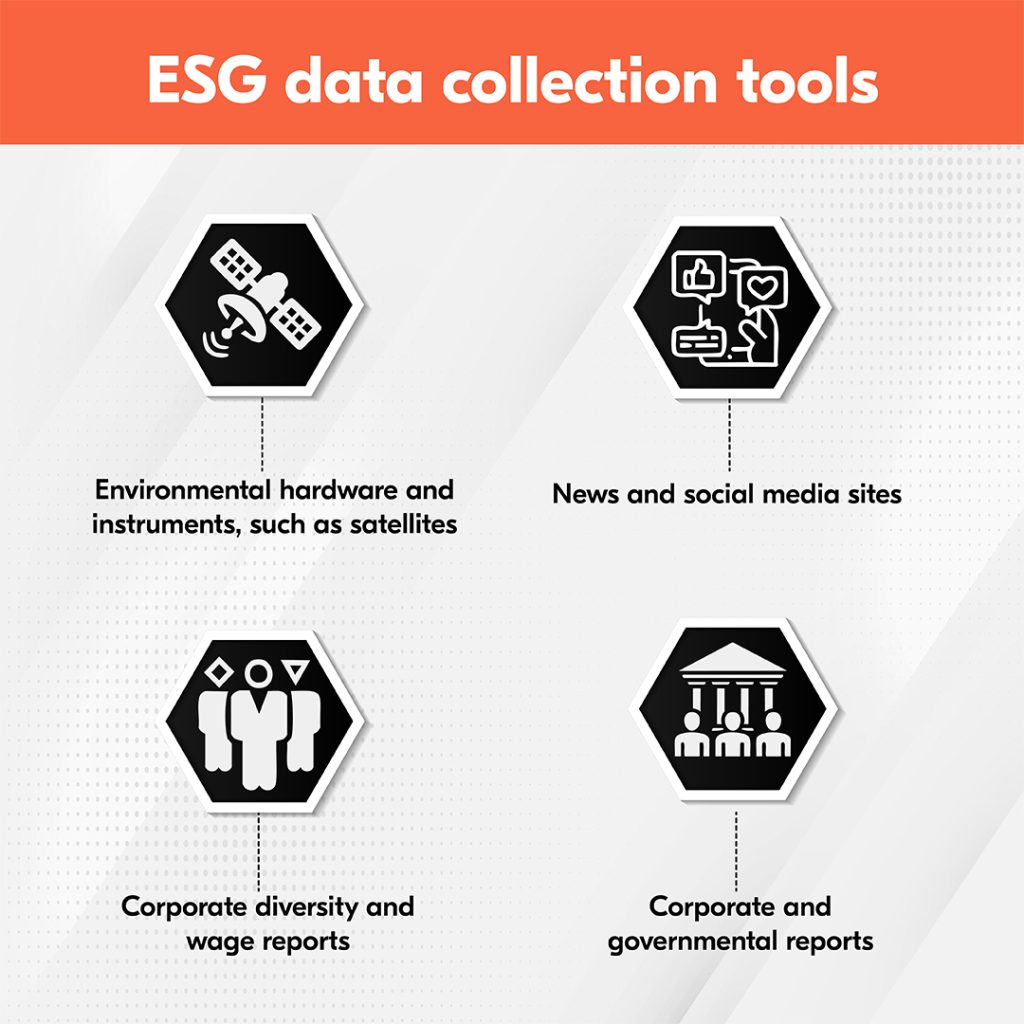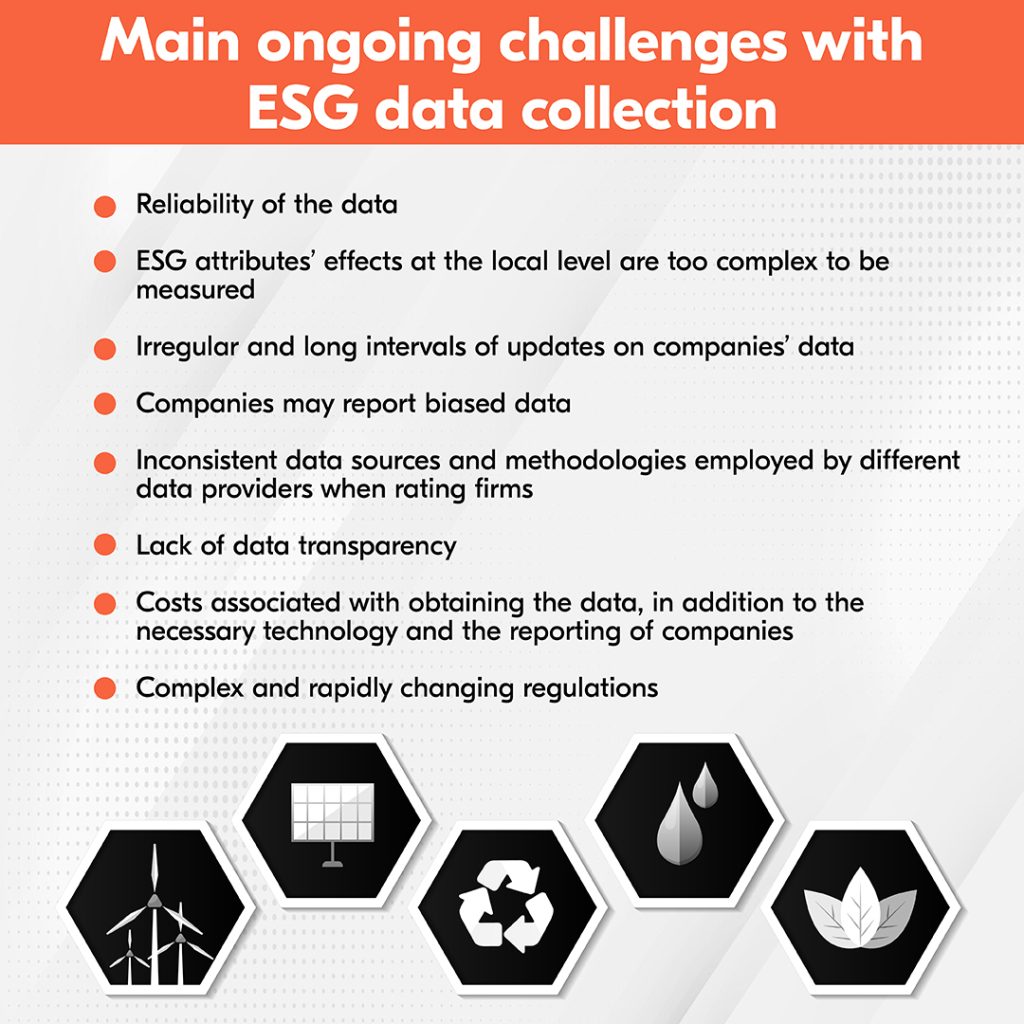A Guide to ESG Data Management
DISCLAIMER: This post was last modified on 28 June 2024. Some information in this article may not be updated.
Companies are putting a heightened effort into their environmental, social and governance (ESG) objectives. Why? A company’s ESG initiatives are viewed as beneficial to the environment, people and business. They also attract stakeholders, business partners and customers, especially those interested in impact investments.
Investors and stakeholders evaluate a company’s sustainability and ethical business practices to manage risk and ensure compliance with regulations. Thus, the importance of ESG data is growing significantly in the financial sector, affecting regulatory compliance and investment decision-making. As the landscape evolves, firms face the complexities of ESG data collection and management.
What is ESG data?
ESG data is the information companies disclose about their operations to assess their sustainability and business principles. This information enables investors and stakeholders to make well-informed investment decisions that align with their values and sustainability goals.
The Corporate Sustainability Reporting Directive (CSRD) requires companies to disclose information on their ESG performance to improve their ESG data transparency, credibility and comparability. Other relevant ESG rules in the EU, such as the EU Taxonomy and Sustainable Finance Disclosure Regulation (SFDR), aim to reinforce transparency and accountability in the private sector regarding ESG impacts and risks. These key policies seek to drive investment and sustainable economic growth in the EU.
ESG Attributes
- Environmental: The environmental attributes measure a company’s environmental impact, including carbon emissions, waste management, energy consumption and resource usage.
- Social: Social aspects of ESG data provide information about labour standards, human capital, diversity, community engagement and customer satisfaction.
- Governance: The governance attributes of ESG data relate to a company’s business ethics, including its board and management structure, involvement in corruption, shareholder rights, compensation and transparency.
ESG data collection
Collecting data is an essential component of ESG data management. The following steps below can help in developing a reliable ESG data collection process:
- Gather data sources and requirements
- Assess the existing information and processes
- Maintain records
- Ensure that management and departments understand the requirement for ESG risk assessment and reporting
- Develop a review process to ensure data ownership and report accuracy
Data collection becomes automated with the use of ESG collection tools. Through intelligent software solutions, streamlined data collection processes are possible. Moreover, access control and similar features make data harvesting easier. Some software can also collect data from other applications through integrations, eliminating the chance of errors in the process.
In addition to collecting ESG data, companies also need to format, report and file it with regulatory bodies. Innovative solutions are a major support system for ESG data management, not just data collection.

Data quality and consistency
ESG data collection continues to be unregulated with limited governance since it is currently not a strict requirement in many areas and does not have the statutory restrictions that come with financial reporting. Additionally, the lack of formal processes for collecting and preparing the data makes ESG reporting risky. As a result, data quality, including reliability, is being compromised, complicating any internal and external data audit.
Enhancing data quality is essential for giving reliable data to internal and external decision-makers. Data collection, storage and transfer should be performed under strict ESG data management practices. Moreover, data should undergo consistency, completeness and reliability testing to ensure it is easy to audit. For data quality and consistency purposes, information about ESGs should be subject to the same disclosure requirements and internal audit procedures as financial reporting data.
Challenges of collecting ESG data
The lack of consistency makes it challenging to evaluate the quality of ESG data. Furthermore, the metrics governing ESG ratings can vary significantly in context and depend on the particular benchmarks used by each ESG dataset provider.

Managing ESG data
Companies that are ahead of the curve in adopting ESG reporting technology and follow best practices for ESG data management are at a competitive advantage. One crucial step to properly managing ESG data is conducting an internal audit or inventory so the firms can devise a strategy to collect all relevant, high-quality data for ESG reporting.
Developing an organised and process-based approach is also vital to ensuring the success of ESG data collection. Companies must establish workflows that the accountable parties can execute and repeat. It is important to learn, adjust and repeat the workflow to measure and manage the data accordingly.
Lastly, companies may optimise available tools and appropriate technologies to facilitate ESG data collection. The ideal ESG data management solution should be transparent, adaptable to processes and built to keep up with ever-changing ESG regulations.
Recommendations
After evaluating the general ESG data challenges, the Luxembourg Sustainable Finance Initiative (LSFI) ESG Data Working Group, which consists of 13 members from various financial institutions with experience and expertise in sustainable finance and ESG data, provided recommendations for best practices and guidelines specific to each asset class.
- Private Assets: Maintain consistent metric calculations by collaborating with portfolio companies, creating a transparent internal evaluation framework and constantly evaluating important information.
- Listed: Conduct initial due diligence on the data providers. Ensure transparency in the data collection process. Create a centralised data architecture with audit trails, track records and a reliable source.
- Debt: Collect ESG data from companies by utilising shared or specialised questionnaires. Examine different reporting formats and ESG data providers to identify sources and solutions that guarantee transparency, neutrality and reliability. Use publicly available information by industry or geography to add to your ESG dataset.
- Indirect Investment: Align your portfolio’s goals with an established framework. Adapt your product’s ESG goals to reduce the possibility of future divergence. Achieve organisation-wide consistency in your data and processes.
Real estate and crypto assets
Comprehensive ESG data for real estate assets must be collected thoroughly to comply with the new regulations and engage with investors, but gathering and gaining access to this data might be difficult. Success requires investment in technologies, robust processes and well-defined strategies.
Blockchain technology establishes a decentralised technical platform built on distributed network trust, highlighting its appeal as an ESG data management solution. However, it is critical to evaluate the possible costs and challenges of using blockchain to store ESG data. Adopting blockchain for ESG data storage requires careful consideration of the effects of cryptocurrencies on the environment. The advantages of utilising blockchain for ESG data management may be outweighed by the energy-intensive nature of cryptocurrencies.
ESG data management: importance and compliance
Executive management oversight is often not extended to ESG data management in many firms since reporting remains within business silos like corporate responsibility, investor relations or human resources. However, many external stakeholders, such as regulators, investors and customers, expect to integrate ESG data management issues into company strategy and continuously assess performance. This highlights the importance of proper ESG data management as part of the sustainability objective of an organisation and ensuring compliance with various legislations and regulatory authorities.
How can we help
We can provide reliable ESG insights to help you integrate ESG factors into your decision-making. This will allow you to focus on proper data management and enhance your business operations to achieve sustainability.
Bolder ESG compliance services
Our team of experts at Bolder Group keeps our clients ahead of the ever-changing ESG landscape. We are committed to assisting companies in promoting inclusive and sustainable growth and navigating regulatory requirements through our bespoke ESG compliance services.
Bolder governance solutions
Bolder values governance and compliance in all aspects of our process and product delivery. We have an in-house team of legal and compliance specialists who provide full governance services to ensure that your compliance and regulatory obligations are met.
Our comprehensive governance and compliance solutions are designed to help your company remain sustainable despite the impact of evolving regulations. You can identify the most relevant aspects of your ESG (Governance) strategy by answering these self-assessment questionnaires.
For more information or any questions, contact our team today.
Bolder Group does not provide financial, tax or legal advice and the information contained herein is meant for general information purposes only. We strongly recommend that before acting on any of the information contained herein, readers should consult with their professional advisers. The Bolder Group accepts no liability for any errors or omissions in the information, or the consequences resulting from any action taken by a reader based on the information provided herein.
Bolder Group refers to the global network of independent subsidiaries of Bolder Group Holding BV. Bolder Group Holding BV provides no client services. Such services are provided solely by the independent companies within the Bolder Group which are each legally distinct and separate entities and have no authority (actual, apparent, implied or otherwise) to obligate or bind Bolder Group Holding BV in any manner whatsoever. The operations of the Bolder Group are conducted independently and have no affiliation with third party financial, tax or legal advisory firms or corporations.
